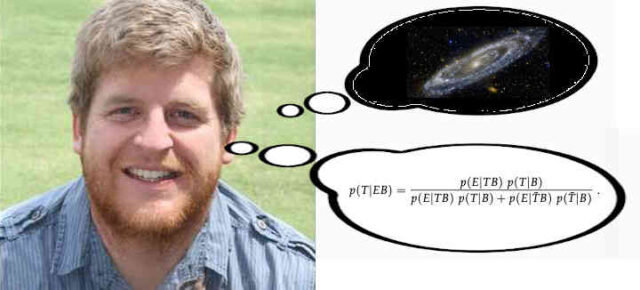Cosmologist Luke Barnes, who has written for years about the scientific evidence for the fine-tuning of the universal laws, has now published a paper on the fine-tuning philosophical argument for the existence of God.
Strictly speaking, it isn’t so much an argument FOR theism, but an argument AGAINST naturalism, but it obviously leads to a theistic conclusion. His argument is based, not on a philosophical syllogism, but from Bayesian probability, which forms part of his work s a scientist.
Cosmology & fine-tuning
The science of the “fine-tuning” of the universe has only been around for about 50 years. Back in the 1960s and 1970s, cosmologists began to report that the existence of the chemicals of the periodic table, the formation of stars and the opportunities for life, and more, required the values of a bunch of numbers to be in a very fine range. These numbers were the size of forces like gravity and electromagnetism, the values of particle masses and charges, and the values of constants in physical formulae.
It soon became clear that, of all the possible universes allowed by the current understanding of physics, a vanishingly small number would support life. If our universe took on those values by chance, its existence was highly improbable.
Battle lines
It wasn’t long before christians and other theists seized on this information and argued that the universe was so improbable by chance that God must have created it. Some of the arguments were based on a poor understanding of the science, but better based arguments were also developed – the design argument of philosopher WL Craig is a good example.
And of course non-theists looked for ways to refute the argument. Some used reasonable arguments based on reasonable science, but others showed all sorts of misunderstandings.
Getting the facts
I wanted to understand the science so I could properly assess the arguments. I read books by Paul Davies, Martin Rees and Leonard Susskind. And I came across the very helpful blog (Letters to nature) of 4 young cosmologists.
By the time I discovered the blog, Luke Barnes wrote most of the posts. And what grabbed my attention the most was his series of posts on fine-tuning and his analysis of what people were saying about it.
Luke was focused on the science, and didn’t generally discuss the arguments for the existence of God that arise from the science. He seemed to be avoiding making any clear statement about his personal belief. It was true that some of the atheists received the strongest criticism, but that seemed to be because they were making the wildest claims.
It was amazing to see how many people were writing about the science of fine-tuning, and doing it badly. Theists and atheists, scientists and non-scientists, they consistently got facts wrong.
Some of the worst cases were:
- Particle Physicist, the late Victor Stenger, developed a small computer program he called MonkeyGod to show that one aspect of fine-tuning, the formation of stars, was overstated. Then he wrote a book about it, and many atheists picked up on his refutation of the fine-tuning argument. Trouble was, Luke pointed out, MonkeyGod had 8 equations and 6 of them were wrong or irrelevant. So Stenger’s model was misleading and worthless.
- Historian Richard Carrier had an online argument with Luke, about the scientific consensus on fine-tuning and the Bayesian statistics Barnes uses. The longer it went on, the worse it looked for Carrier.
- Biologist PZ Myers was also shown to be talking about something he knew little about.
Plenty of others, from all different viewpoints, did better. Reading all Luke’s analysis took me out of my depth when he discussed the mathematics, but I could follow the logic. I learnt that theoretical physics was quite capable of analysing the extent of fine-tuning and the science was pretty well established.
Talks
Barnes went on to give many recorded talks on the science of fine-tuning. Worth watching are two talks (Part 1 and Part 2) at the UCSC Summer School for the Philosophy of Cosmology, 2013.
More recently, following the release of the book he co-authored (see below), he and co-author Geraint Lewis have done a lot of talks together, either under the title of the book (Life in a Finely Tuned Universe) or the title Alas Lewis and Barnes.
Also worth listening to is this radio discussion with atheist and fellow cosmologist, Sean Carroll. The earlier talks and blog posts tend to be just about the science, with Luke noncommittal about the theistic implications, but here he identifies as a theist. It is encouraging to hear the two disagree politely and respectfully.
In more recent interviews, Luke has been clearer about his personal belief. In this 2020 interview, he says he had a christian upbringing. So it isn’t clear whether his previous reticence was because he was more agnostic back then, or simply because he was choosing not to go beyond the science.
Publications
There has obviously been great interest in this topic, and Luke took his writing beyond the blog:
- There were articles in magazines, such as The Fine-tuning of nature’s laws in The New Atlantis in 2015.
- Then Luke had the paper The Fine-Tuning of the Universe for Intelligent Life published in Publications of Astronomical Society of Australia and available online in Arxiv.
- Then in 2016 A Fortunate Universe: Life in a Finely Tuned Cosmos by Geraint Lewis and Luke Barnes was published by Cambridge University Press. This book is very informative and has a dry humour that helps it to be very readable. It sets out all the scientific evidence and in a most interesting final chapter has a discussion between atheist Lewis and christian Barnes about the theistic and other implications of scientific fine-tuning.
And now …. philosophy
Recently, Luke published a philosophical paper on the fine-tuning theistic argument.
There have been two main approaches to the fine-tuning argument:
- Philosopher WL Craig and others have formulated the argument in the form of a syllogism – a logical argument with premises and a conclusion. The argument is that our universe could have been different or else it couldn’t have been different (physical necessity). If it could have been different, it took this form either because it was designed or not designed (chance). The science is then used to argue that it wasn’t chance or necessity, so it must have been designed.
- Alternatively, Richard Swinburne and others have formulated an argument based on probability. Instead of trying to prove that the universe was designed, the argument aims to show that it is much more likely that it was designed than random.
Luke’s argument takes the latter approach, with the difference that, as a cosmologist, he approaches both the science and the probabilities in a different way. One innovation is he sets aside any thought of estimating a probability of a life-permitting universe with any laws of physics we could imagine – what he calls “the big question”. This is too difficult to answer, so he answers instead “the little question” of the probability that the 31 parameters or constants of current physics could have randomly allowed life – which he can calculate within the limits of current knowledge.
He uses his cosmological expertise to show that, granted the known laws of physics, a life-permitting universe is extremely unlikely without a God (i.e. if naturalism is true); an estimate of probability of no more than 10-136. But, he argues, a life-permitting universe is much more likely (or less unlikely) than that if there is a creator God.
But, he then argues, it is hard to see how the big question could give a very different answer to the little question, so it seems highly unlikely that the universe could have been the way it is if naturalism is true. Thus it is more likely that naturalism is untrue. He then answers a number of objections to his approach.
I have examined the argument in more detail in An alternative fine-tuning argument.
Worth checking out
I don’t suppose any of this is the final word on fine-tuning – either the science or the philosophy. But if you’re interested, checking out some of the references should get you up to date with the subject.
The science continues to be investigated, so the estimates of probability can only get more accurate in time. And many atheists think the fine-tuning argument is perhaps the strongest theistic argument.







